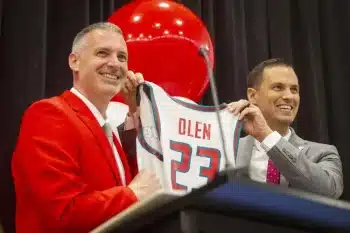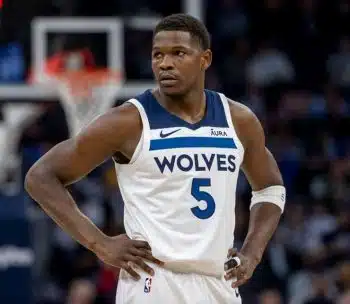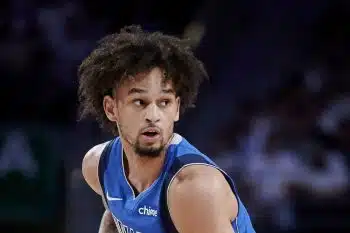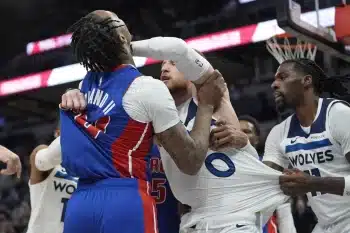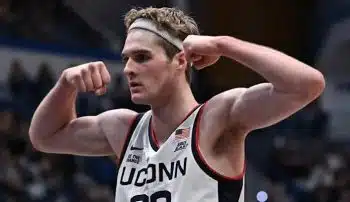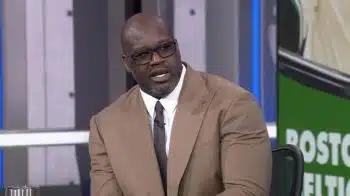NBA
2019 NBA Draft Trade Recap
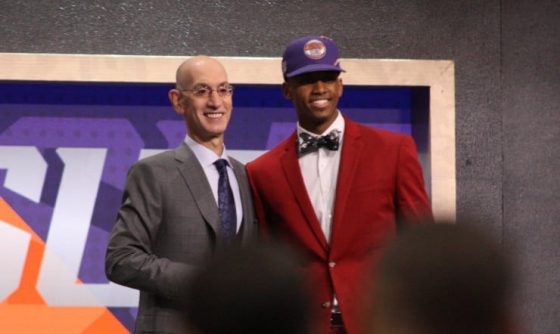
The 2019 NBA Draft started off with more trade activity than expected as most experts even predicted a record-breaking night as far as trades were concerned. With many big-name stars on the move pre-draft, rumors galore and the pending free agency period, all 30 teams were looking to maneuver in a way that best suited their current course of action. But when the dust eventually settled, the final count ended at an above-average total of 12 draft night trades. Here is a comprehensive list of all of the deals agreed to on draft night.
Atlanta: Acquired the fourth overall pick from New Orleans and selected De’Andre Hunter, along with the 57th overall pick (Jordan Bone) a future second-round pick and Solomon Hill
New Orleans: Traded down for the eighth (Jaxon Hayes), 17th (Nickeil Alexander-Walker) and 35th overall picks (Marcos Louzada Silva), as well as a protected 2020 first-round pick (via Cleveland).
This move clearly benefits the Hawks by sending them a top-tier talent. Hunter gives Atlanta a talented two-way player who is a capable shooter and defender. He will join Trae Young, John Collins and Kevin Huerter and Cam Reddish on a strong, young team, thus speeding up the timeline on the rebuild significantly.
Hunter, the centerpiece of the trade, is an elite 3-and-D guy. He should have an immediate impact on the Hawks given his length and noteworthy defensive versatility.
Elsewhere, the Pelicans were able to net two prospects that they like while clearing Hill’s salary, freeing up significant salary cap space immediately. They felt that they didn’t have to make the fourth selection considering they drafted Zion Williamson with the first overall pick minutes earlier.
Additionally, the Pelicans may also consider packaging a number of their 2019 draft picks for an established star or, perhaps, even sign one outright thanks to their new, lighter salary cap situation.
Minnesota: Acquired the sixth overall pick (Jarrett Culver)
Phoenix: Traded down for Dario Saric and the 11th overall pick (Cameron Johnson)
The Timberwolves clearly had eyes for Culver — and why wouldn’t they? Culver is a solid player that can score in bunches. He prides himself on his defensive abilities and projects well as a complete player who can help a team without requiring too many touches.
The Suns were obviously enamored with Saric, that much is clear. Ultimately, their selection of Johnson is a bit puzzling considering his injury history (hips), age (23) and where he was rated as a prospect (widely-viewed as a late first-rounder at the earliest); but the Suns clearly saw something. Maybe the Suns thought they had enough backcourt assets with Devin Booker and Mikal Bridges — typically, however, when a young team has an opportunity to draft a player like Culver, they capitalize on it.
Philadelphia: Acquired the 20th overall pick (Matisse Thybulle).
Boston: Traded back for the 24th (Ty Jerome) and 33rd (Carsen Edwards) overall picks
*Jerome was later traded to Phoenix along with Aaron Baynes for a 2020 first-round pick (via Milwaukee).
The Celtics were clearly not overly-sold on any prospects available in the 20-24 range. During the draft, allegedly, Boston was hoping to consolidate picks and move up. And when that didn’t come to fruition, they had to decide if they really wanted to bring on so many rookies.
Philadelphia potentially acquired the best perimeter defender in the draft in Thybulle. There were rumors they were interested in Nassir Little and Kevin Porter Jr., but they pounced when they realized Thybulle was available — in turn, the 76ers received an immediate impact player.
Phoenix’s acquisition of Jerome makes sense. Jerome is a 6-foot-5 point guard that shot over 40 percent from three-point range in his three-year career at Virginia — and the Suns, of course, are in need of a point guard. He distributes the ball well for a combo guard, but can he develop in as a true point guard? The Suns will hope so.
Further, giving up the 2020 Milwaukee pick after trading away the sixth overall pick was curious. Presumably, the Suns figured that Giannis Antetokounmpo stays in Milwaukee, the Bucks remain dominant in the Eastern Conference and that 2020 first-round pick turns out to be lower than 24.
Memphis: Acquired the 21st overall pick (via Utah) and selected Brandon Clarke
Oklahoma City: Traded down to the 23rd overall pick and selected Darius Bazley
The Grizzlies added Clarke to their young core, which also includes rookie phenom Ja Morant and the promising Jaren Jackson Jr. They should grow together nicely and Clarke’s extreme athleticism should fit perfectly with Morant. Clarke is also an elite defender, which means that the Grizzlies now have two potential defensive stoppers in him and Jackson Jr. Clarke is a relatively-high IQ guy that is poised and deliberate — on the court and in his interactions with the media — which usually bodes well for both the player and the team.
For the Thunder, this deal was all about savings. Oklahoma City is well over the salary cap and trying to mitigate spending as much as possible. While trading away Clarke hurts, it’s a means to an end.
Los Angeles Clippers: Acquired the 27th overall pick and selected Mfiondu Kabengele
Brooklyn: Received a future first-round pick (via Philadelphia) and the 56th overall pick (Jaylen Hands)
The Nets did not want to add any guaranteed salary given their pursuit of two max salary cap slots, hence the trade of another first-round pick.
And while the Clippers are also seeking two max slots, they are far enough below the cap that the 27th pick doesn’t hurt their pursuit of cap space.
Hands is an explosive point guard and an above-average defender. He uses his above-average quickness effectively and possesses an NBA-level shooting range. On the other end, Kabengele just adds to the Clippers’ young core, a shrewd pick-up that just won his conference’s Sixth Man of the Year award in 2018-19 — think Los Angeles could use another player like that?
You betcha.
Cleveland: Acquired the 30th overall pick (Kevin Porter Jr.)
Detroit: Received four future second-round picks and cash considerations
Not including Bol Bol, Porter Jr. probably had the biggest drop of all the top prospects. But he was ultimately selected with the last pick in the first round due to the Cavaliers trading up. He’s viewed as a steal at No. 30 at this point in time, rightfully so given his raw potential. Still, there are maturity concerns regarding Porter Jr. that must be addressed. He will likely be given room to grown and learn on the fly in Cleveland, but he must make good decisions both on and off the court. 29 teams passed on Porter Jr., so it’s up to him to prove them wrong.
And if Detroit is among the teams that had doubts about Porter Jr., they received a fair amount of compensation for the right to pick him — future second-rounders and $5 million in case. Could Porter Jr. have helped Detroit? Possibly. But given the doubts around him, the Pistons made a prudent decision.
Washington: Acquired Jonathan Simmons and the 42nd overall pick (Admiral Schofield).
Philadelphia: Received cash considerations
The 76ers clearly wanted to move Simmons. They traded away the rights to Admiral Schofield to get out of Simmons’ contract, which helps free up additional salary cap space — the 76ers are rumored to be interested in offering Tobias Harris and Jimmy Butler max deals come free agency — and they need all the space the can get.
The Wizards, on the other hand, are stuck between rebuilding and competing — although competing seems challenging given the John Wall injury history and contract. So if trading for a player whose deal expires following the 2019-20 season is the cost to bring on Schofield, that’s a penalty the Wizards were willing to incur.
Schofield is a good shooter and scores well in the post. He projects to be similar to Jae Crowder, assuming all works out well for him. As a competitive gamer, Schofield will help the Wizards immediately on the offensive end. He’s likely to give up some height on defense, given that he’s a small forward — however, his grit and athleticism should help him keep pace.
Miami: Acquired the 32nd overall pick (KZ Okpala)
Suns: Received three future second-round picks
KZ Okpala projects to be similar to Rodney Hood, which is clearly not a bad thing given how Hood played in the 2019 NBA Playoffs. Okpala is super athletic and has good measurements of 6-foot-8 and 195 lbs. He can run the floor, handle the ball and is an above-average shot-maker. He needs to improve a bit defensively, but Miami will work with him on this.
The Suns could have used Okapala, as could most teams. But at the same time, three second-round picks can be a pretty big haul too. And the Suns, like many other teams selling second-rounders, already have their share of youth, which presents unique challenges.
Denver: Acquired the 44th overall pick (Bol Bol)
Miami: Received a future second-round pick and cash considerations
Bol Bol was projected as high as the lottery — but his night did not pan out how he would’ve liked. Nevertheless, any time a team identifies a prospect as someone of interest, that prospect should be thankful.
Bol was always going to be a risky selection given his foot injury, his extremely slim build and his surprisingly-high body fat percentage. Still, Bol Bol offers skills not previously seen in a player his size. He shoots incredibly well from three-point range and can grow into an above-average shot blocker. And given the Nuggets’ depth, they can bring him along slowly. Their player development team has their hands full with a guy whose drive and desire have been questioned — but the upside is not in doubt.
Los Angeles Lakers: Acquired the 46th overall pick (Talen Horton-Tucker)
Orlando: Received cash considerations
This move was a must-have for the Lakers, who are in need of cheap talent. If Los Angeles is serious about chasing a third max free agent, Horton-Tucker is solid fit — both rotationally and financially.
Horton-Tucker is a strong guard who boasts a ridiculous 7-foot-1 wingspan (considering he’s only 6-foot-4). He can defend both guard positions, allowing him to have an immediate impact if need be. Further, he doesn’t turn 19 years-old until November, which means he has more time than most to mature and develop.
The Magic were clearly more interested in the cash than they were in on-boarding another rookie.
Golden State: Received the 39th overall pick (Alen Smailagic)
New Orleans: Received two future second-round picks and cash considerations
Smailagic is an 18 -year-old shooter from Serbia that the Warriors monitored/hid in the G League last season as he was too young and ineligible for the NBA Draft. He was kept away from most showcases last year and the Warriors cashed in on draft night. He averaged 9.1 points last season for the Santa Cruz Warriors.
The Pelicans, on the other hand, are already committed to developing four rookies. In the end, they did not need a fifth, especially considering the number of other young players who still need guidance, too — e.g., Brandon Ingram and Lonzo Ball.
Detroit: Acquired the 57th overall pick (Jordan Bone)
New Orleans: Received cash considerations
Jordan Bone took a chance after relatively-disappointing freshmen and sophomore seasons with Tennessee. It paid off when Detroit traded for the 57th overall pick, using it to select Bone. The speedy guard averaged 16.3 points and 7.1 assists per game last season for the Volunteers. Bone led the third-most efficient offense in the country last year, which bodes well for a player who will likely struggle to find a spot immediately.
As far as the Pelicans are concerned, it makes sense that they would trade away the 57th overall pick considering they traded away the 39th too.
